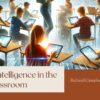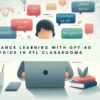Introduction
Overview of AI in Higher Education
In today’s rapidly evolving technological landscape, Artificial Intelligence (AI) stands as a beacon of innovation and transformation. Its applications are vast, and its potential is boundless, but nowhere is this more apparent than in the realm of AI in higher education.
The Arrival of AI: A New Era
OpenAi’s groundbreaking release of ChatGPT sent ripples across the academic world, leading to countless opinions, surveys, and news stories about how disruptive this tool could be for colleges and universities globally. But what does this mean for higher education? How can institutions harness AI for good, and what are the implications of this technological revolution?
AI: A Double-Edged Sword
AI’s possibilities may seem endless—and a little intimidating. The fear of AI replacing human roles and the potential ethical dilemmas it poses are real. However, most higher education institutions have been quick to embrace the positives.
Universities that want to stay ahead of the curve are already considering ways that AI can improve efficiencies and workflows, boost student success, and become a critical part of research, retention, admissions, instruction, and more. Meanwhile, colleges that aren’t embracing AI risk being left behind.
The Potential to Disrupt and Benefit
The disruption that AI and machine learning may bring doesn’t need to be a bad thing. The technology holds the promise to transform education, making it more personalized, efficient, and aligned with market demands. From enhancing the student experience to evolving the way instruction and assessments are delivered, AI’s benefits are tangible and promising.
The introduction of AI in higher education is not just a trend; it’s a paradigm shift that’s already underway. As we delve into this topic, we’ll explore how AI is disrupting traditional education models, the benefits it brings, and how colleges and universities can leverage this technology to prepare students for a future where AI is an integral part of the workforce.
AI’s Impact on Higher Education
Embracing AI: Opportunities and Challenges
Harnessing AI for Good
The possibilities for AI in higher education are vast and exciting. From improving administrative workflows to enhancing student success, AI offers a plethora of opportunities for colleges and universities.
- Efficiencies and Workflows: AI can streamline various administrative tasks, reducing the burden on staff and allowing them to focus on more critical areas.
- Boosting Student Success: Through personalized learning paths and predictive analytics, AI can identify students’ needs and provide tailored support, enhancing their overall success.
- Research, Retention, Admissions, and More: AI’s applications extend to diverse areas, including research, student retention, admissions processes, and instructional methods.
However, embracing AI is not without challenges. Institutions must navigate ethical considerations, potential biases in algorithms, and the fear of AI replacing human roles. The key lies in understanding and implementing AI responsibly, ensuring that it serves the greater good of education.

The Fear and Reality of AI in Higher Education
AI’s disruptive potential can be both a boon and a bane. While it offers unprecedented opportunities for innovation, it also raises concerns and fears.
- Implications and Potential: AI’s ability to transform education is clear, but it requires careful planning and ethical considerations.
- Fear of Disruption: The fear that AI might replace human educators or lead to biased decisions is real but can be mitigated through responsible implementation.
Universities that want to stay ahead of the curve are already exploring ways AI can enhance various aspects of education. Those who aren’t embracing AI risk falling behind and missing out on the benefits that this technology can offer.
The impact of AI on higher education is multifaceted, offering both opportunities and challenges. As we continue to explore this subject, we’ll delve into specific areas like admissions, curriculum alignment, student experiences, and how universities are responding to this technological paradigm. The journey of AI in higher education is just beginning, and its potential to transform the educational landscape is immense.
AI in Colleges: Admissions and Curriculum
Admissions Process Transformation
The admissions process in colleges is undergoing a significant transformation, thanks to AI. From enrollment strategies to application processes, AI is playing a pivotal role in reshaping how colleges admit students.
- Enrollment Strategies: AI algorithms can analyze vast amounts of data to predict enrollment trends, helping colleges to plan and strategize effectively.
- Application Process: AI-powered chatbots can guide students through the application process, answering questions and providing support, making admissions more accessible and efficient.

Utilizing AI in admissions goes beyond mere efficiency; it’s about crafting a personalized and responsive experience for students.
Curriculum Alignment with Market Demands
In an ever-changing job market, colleges must ensure that their curriculum is aligned with market demands. AI is instrumental in this alignment, offering insights into industry needs and helping to shape disciplines and efficiencies.
- Analyzing Market Demands: AI can analyze current job market trends and demands, helping colleges to tailor their courses and programs accordingly.
- Enhancing Efficiencies: Through AI, colleges can create more efficient learning paths, ensuring that students are prepared for the careers that await them.
Adopting AI is more than enhancing efficiency; it involves creating a personalized and interactive encounter for each student.
The integration of AI in colleges is transforming both admissions and curriculum. By leveraging AI, colleges can create more efficient, responsive, and personalized experiences for students. From guiding them through the application process to preparing them for the job market, AI’s role in shaping the future of education is undeniable.
As we continue to explore the impact of AI on higher education, we’ll delve into the student learning experience, technology adoption by universities, and how colleges and universities are investing in AI. The potential of AI to enhance education is vast, and its implications are far-reaching.
Students and Learning Experience
Personalized Learning and Teaching
One of the most promising applications of AI in higher education is the personalization of learning and teaching. By understanding individual students’ needs, preferences, and learning styles, AI can create tailored educational experiences. This personalization is already being embraced, with 67% of UK secondary school students using AI for homework and assignments, and half of Cambridge students having used AI for university work.
- Personalized Curriculum: AI can analyze students’ performance and learning patterns to create customized learning paths, helping them to learn more effectively.
- Enhanced Teaching Methods: Educators can leverage AI to gain insights into students’ understanding and engagement, allowing them to adapt their teaching methods to better support individual learners.
Preparing Students for an AI-Driven Job Market
As AI continues to permeate various industries, it’s essential that students are prepared to work alongside these technologies. Higher education institutions have a responsibility to ensure that their graduates are ready for this new reality. In fact, 43% of college students say they have experience using AI tools such as ChatGPT, and of those, 50% have used them to help complete assignments or exams.
- Integrating AI into Courses: By incorporating AI into the curriculum, students can gain hands-on experience and understanding of how AI works and its potential applications.
- Collaboration with Industry: Universities and colleges can collaborate with industry leaders to ensure that their programs align with the current and future demands of the job market.

The Growing Role of AI in Student Work
AI’s influence on student work is growing, with 22% of all college students in a survey by BestColleges.com using AI to complete their schoolwork. However, there is still room for growth, as fewer than 10% of college assignments contained AI, according to a study by Copyleaks.
The student learning experience is at the heart of education, and AI has the potential to transform it in profound ways. From personalizing learning paths to preparing students for an AI-driven job market, the implications are far-reaching. The embrace of AI in education is not just about technology; it’s about a fundamental shift in how we approach teaching and learning. It’s about leveraging technology to create more human-centric, responsive, and adaptive educational experiences.
Universities and Technology Adoption
Responding to the AI Paradigm
The advent of AI is more than a technological advancement; it’s a paradigm shift that requires a comprehensive response from universities. Embracing this new reality involves several key areas:
- Strategic Planning: Universities must develop clear strategies for integrating AI into various aspects of education, including research, teaching, and administration.
- Ethical Considerations: The responsible implementation of AI requires careful consideration of ethical implications, including potential biases and the impact on human roles.
- Collaboration and Innovation: Universities must foster a culture of innovation and collaboration, working with industry partners, researchers, and educators to harness the full potential of AI.
Technology in Admissions and Student Retention
AI’s role in universities extends to admissions and student retention, where it can have a transformative impact:
- Admissions Process: AI can streamline the admissions process, making it more efficient and personalized. From predictive analytics to AI-powered chatbots, technology can enhance the entire admissions experience.
- Student Retention: AI is being used by colleges and universities to automate tasks such as enrollment and retention, enabling targeted interventions to support retention.
Preparing Universities for Transformation
The integration of AI into universities is not a one-time event; it’s an ongoing transformation that requires continuous adaptation and learning:
- Investment in Technology and Training: Universities must invest in the necessary technology and provide training for staff and faculty to effectively utilize AI.
- Alignment with Academic Goals: The adoption of AI must align with the university’s broader academic goals, ensuring that technology serves the educational mission.
The adoption of AI by universities is a complex and multifaceted process that requires strategic planning, ethical consideration, and a commitment to continuous learning and adaptation. The potential benefits are immense, from enhancing administrative efficiency to transforming the student experience.
As we continue to explore the impact of AI on higher education, we’ll delve into how colleges and universities are investing in AI, the role of AI in curriculum development, and the broader implications of this technological revolution.
The future of higher education is intertwined with AI, and universities that respond effectively to this paradigm will be at the forefront of educational innovation and excellence.
Colleges and Universities: Investment and Programs
Investing in AI: A Strategic Priority
In the face of an ever-evolving technological landscape, colleges and universities are recognizing the need to invest in AI. This investment goes beyond mere financial resources; it encompasses a strategic commitment to harnessing AI’s potential:
- Infrastructure and Technology: Building the necessary infrastructure to support AI initiatives, including hardware, software, and network capabilities.
- Training and Development: Investing in professional development for faculty and staff to ensure they have the skills and knowledge to leverage AI effectively.
- Research and Innovation: Supporting research initiatives that explore AI’s potential applications and implications in various academic disciplines.
AI and Academic Programs: A Synergistic Approach
The integration of AI into academic programs is not just about technology; it’s about creating a synergistic relationship between AI and education:
- Curriculum Development: Incorporating AI into the curriculum across disciplines, ensuring that students are prepared for a future where AI is an integral part of various industries.
- Collaboration with Industry: Forming partnerships with industry leaders to ensure that academic programs align with real-world needs and opportunities.
- Interdisciplinary Approach: Encouraging collaboration across disciplines to explore how AI can enhance various fields of study, from humanities to sciences.
Responding to Market Demands
The investment in AI by colleges and universities is also a response to market demands. Nationally, degree conferrals in AI-related fields have increased steadily at approximately 5 percent annually since 2010. Online universities and large public universities are graduating high numbers of students in AI-related fields compared to other degree levels.
The investment in AI by colleges and universities is a complex and multifaceted endeavor that requires strategic planning, collaboration, and a commitment to continuous learning. It’s about recognizing the transformative potential of AI and taking proactive steps to harness it for the benefit of education.
As we conclude our exploration of AI in higher education, we’ll reflect on the broader implications of this technological revolution, the promise it holds, and the challenges that lie ahead.
The journey of AI in higher education is just beginning, and its impact will continue to unfold in the years to come. The institutions that embrace this journey will be at the forefront of educational innovation and excellence.
Conclusion: The Promise and Future of AI in Higher Education
The journey into the world of AI in higher education has been both enlightening and inspiring. From the transformation of admissions processes to the personalization of learning experiences, the potential of AI to enhance education is vast and multifaceted.
A Transformative Force
AI is not just a technological tool; it’s a transformative force that is reshaping the very fabric of education. It’s enabling colleges and universities to become more efficient, responsive, and innovative. It’s empowering educators to connect with students in new and meaningful ways. And it’s preparing students for a future where AI is an integral part of the workforce.
Embracing the Promise
The promise of AI in higher education is not without challenges. Ethical considerations, potential biases, fears of disruption, and the need for continuous learning and adaptation are all part of this complex landscape. But the institutions that embrace this promise, that invest in AI responsibly and thoughtfully, will be at the forefront of educational innovation and excellence.
Actionable Takeaways
As we reflect on the impact of AI on higher education, several actionable takeaways emerge:
- Invest in AI Strategically: Colleges and universities must invest in AI with a clear vision and strategy, aligning technology with educational goals.
- Foster Collaboration and Innovation: Building partnerships with industry, encouraging interdisciplinary collaboration, and fostering a culture of innovation are essential.
- Prepare Students for the Future: Integrating AI into the curriculum and ensuring that students are prepared for an AI-driven job market is a critical responsibility.
- Embrace Continuous Learning: Recognizing that the AI landscape will continue to evolve, institutions must foster a culture of continuous learning and adaptability.
A New Paradigm
The integration of AI into higher education is not just a trend; it’s a new paradigm that’s already underway. It’s a journey filled with opportunities, challenges, and immense potential. And it’s a journey that we are all part of, whether as educators, administrators, students, or simply curious observers.
The future of higher education is intertwined with AI, and the possibilities are as boundless as our imagination and our willingness to embrace this transformative potential.









Recent Comments